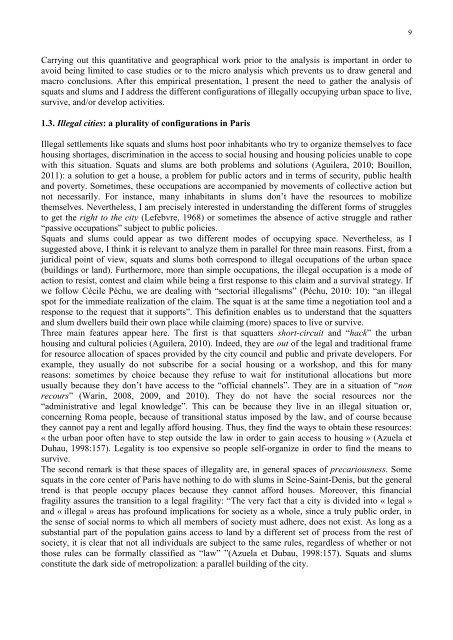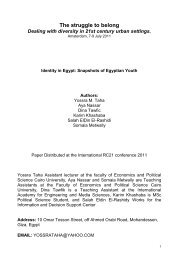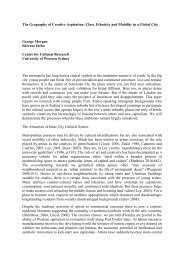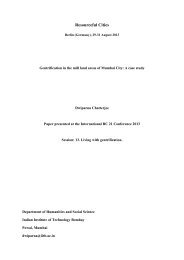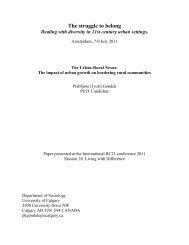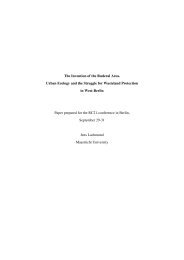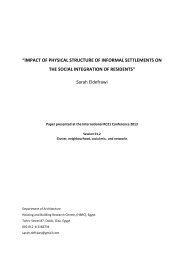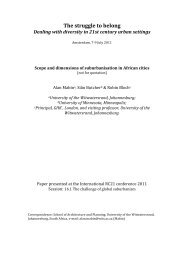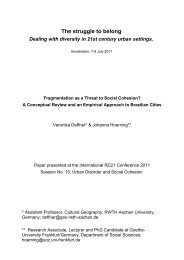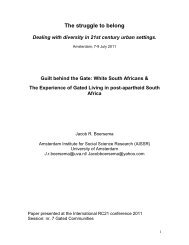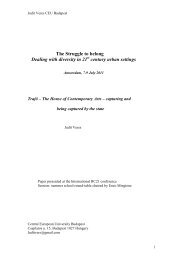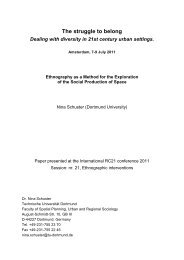The hidden side of metropolization. Governing squats and slums in ...
The hidden side of metropolization. Governing squats and slums in ...
The hidden side of metropolization. Governing squats and slums in ...
Create successful ePaper yourself
Turn your PDF publications into a flip-book with our unique Google optimized e-Paper software.
9<br />
Carry<strong>in</strong>g out this quantitative <strong>and</strong> geographical work prior to the analysis is important <strong>in</strong> order to<br />
avoid be<strong>in</strong>g limited to case studies or to the micro analysis which prevents us to draw general <strong>and</strong><br />
macro conclusions. After this empirical presentation, I present the need to gather the analysis <strong>of</strong><br />
<strong>squats</strong> <strong>and</strong> <strong>slums</strong> <strong>and</strong> I address the different configurations <strong>of</strong> illegally occupy<strong>in</strong>g urban space to live,<br />
survive, <strong>and</strong>/or develop activities.<br />
1.3. Illegal cities: a plurality <strong>of</strong> configurations <strong>in</strong> Paris<br />
Illegal settlements like <strong>squats</strong> <strong>and</strong> <strong>slums</strong> host poor <strong>in</strong>habitants who try to organize themselves to face<br />
hous<strong>in</strong>g shortages, discrim<strong>in</strong>ation <strong>in</strong> the access to social hous<strong>in</strong>g <strong>and</strong> hous<strong>in</strong>g policies unable to cope<br />
with this situation. Squats <strong>and</strong> <strong>slums</strong> are both problems <strong>and</strong> solutions (Aguilera, 2010; Bouillon,<br />
2011): a solution to get a house, a problem for public actors <strong>and</strong> <strong>in</strong> terms <strong>of</strong> security, public health<br />
<strong>and</strong> poverty. Sometimes, these occupations are accompanied by movements <strong>of</strong> collective action but<br />
not necessarily. For <strong>in</strong>stance, many <strong>in</strong>habitants <strong>in</strong> <strong>slums</strong> don’t have the resources to mobilize<br />
themselves. Nevertheless, I am precisely <strong>in</strong>terested <strong>in</strong> underst<strong>and</strong><strong>in</strong>g the different forms <strong>of</strong> struggles<br />
to get the right to the city (Lefebvre, 1968) or sometimes the absence <strong>of</strong> active struggle <strong>and</strong> rather<br />
“passive occupations” subject to public policies.<br />
Squats <strong>and</strong> <strong>slums</strong> could appear as two different modes <strong>of</strong> occupy<strong>in</strong>g space. Nevertheless, as I<br />
suggested above, I th<strong>in</strong>k it is relevant to analyze them <strong>in</strong> parallel for three ma<strong>in</strong> reasons. First, from a<br />
juridical po<strong>in</strong>t <strong>of</strong> view, <strong>squats</strong> <strong>and</strong> <strong>slums</strong> both correspond to illegal occupations <strong>of</strong> the urban space<br />
(build<strong>in</strong>gs or l<strong>and</strong>). Furthermore, more than simple occupations, the illegal occupation is a mode <strong>of</strong><br />
action to resist, contest <strong>and</strong> claim while be<strong>in</strong>g a first response to this claim <strong>and</strong> a survival strategy. If<br />
we follow Cécile Péchu, we are deal<strong>in</strong>g with “sectorial illegalisms” (Péchu, 2010: 10): “an illegal<br />
spot for the immediate realization <strong>of</strong> the claim. <strong>The</strong> squat is at the same time a negotiation tool <strong>and</strong> a<br />
response to the request that it supports”. This def<strong>in</strong>ition enables us to underst<strong>and</strong> that the squatters<br />
<strong>and</strong> slum dwellers build their own place while claim<strong>in</strong>g (more) spaces to live or survive.<br />
Three ma<strong>in</strong> features appear here. <strong>The</strong> first is that squatters short-circuit <strong>and</strong> “hack” the urban<br />
hous<strong>in</strong>g <strong>and</strong> cultural policies (Aguilera, 2010). Indeed, they are out <strong>of</strong> the legal <strong>and</strong> traditional frame<br />
for resource allocation <strong>of</strong> spaces provided by the city council <strong>and</strong> public <strong>and</strong> private developers. For<br />
example, they usually do not subscribe for a social hous<strong>in</strong>g or a workshop, <strong>and</strong> this for many<br />
reasons: sometimes by choice because they refuse to wait for <strong>in</strong>stitutional allocations but more<br />
usually because they don’t have access to the “<strong>of</strong>ficial channels”. <strong>The</strong>y are <strong>in</strong> a situation <strong>of</strong> “non<br />
recours” (War<strong>in</strong>, 2008, 2009, <strong>and</strong> 2010). <strong>The</strong>y do not have the social resources nor the<br />
“adm<strong>in</strong>istrative <strong>and</strong> legal knowledge”. This can be because they live <strong>in</strong> an illegal situation or,<br />
concern<strong>in</strong>g Roma people, because <strong>of</strong> transitional status imposed by the law, <strong>and</strong> <strong>of</strong> course because<br />
they cannot pay a rent <strong>and</strong> legally afford hous<strong>in</strong>g. Thus, they f<strong>in</strong>d the ways to obta<strong>in</strong> these resources:<br />
« the urban poor <strong>of</strong>ten have to step out<strong>side</strong> the law <strong>in</strong> order to ga<strong>in</strong> access to hous<strong>in</strong>g » (Azuela et<br />
Duhau, 1998:157). Legality is too expensive so people self-organize <strong>in</strong> order to f<strong>in</strong>d the means to<br />
survive.<br />
<strong>The</strong> second remark is that these spaces <strong>of</strong> illegality are, <strong>in</strong> general spaces <strong>of</strong> precariousness. Some<br />
<strong>squats</strong> <strong>in</strong> the core center <strong>of</strong> Paris have noth<strong>in</strong>g to do with <strong>slums</strong> <strong>in</strong> Se<strong>in</strong>e-Sa<strong>in</strong>t-Denis, but the general<br />
trend is that people occupy places because they cannot afford houses. Moreover, this f<strong>in</strong>ancial<br />
fragility assures the transition to a legal fragility: “<strong>The</strong> very fact that a city is divided <strong>in</strong>to « legal »<br />
<strong>and</strong> « illegal » areas has pr<strong>of</strong>ound implications for society as a whole, s<strong>in</strong>ce a truly public order, <strong>in</strong><br />
the sense <strong>of</strong> social norms to which all members <strong>of</strong> society must adhere, does not exist. As long as a<br />
substantial part <strong>of</strong> the population ga<strong>in</strong>s access to l<strong>and</strong> by a different set <strong>of</strong> process from the rest <strong>of</strong><br />
society, it is clear that not all <strong>in</strong>dividuals are subject to the same rules, regardless <strong>of</strong> whether or not<br />
those rules can be formally classified as “law” ”(Azuela et Dubau, 1998:157). Squats <strong>and</strong> <strong>slums</strong><br />
constitute the dark <strong>side</strong> <strong>of</strong> <strong>metropolization</strong>: a parallel build<strong>in</strong>g <strong>of</strong> the city.


